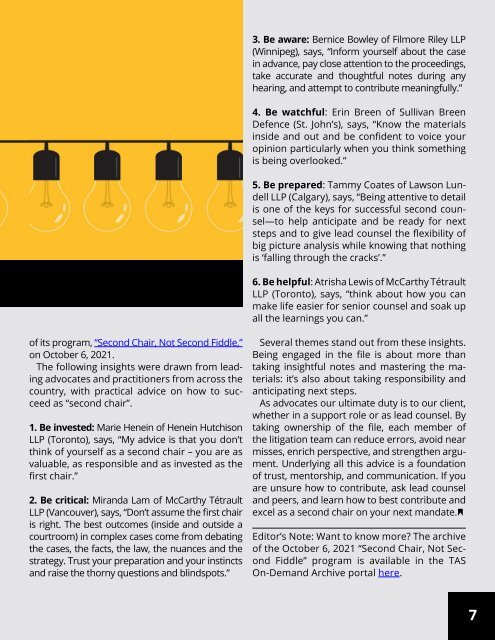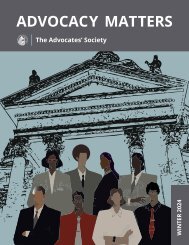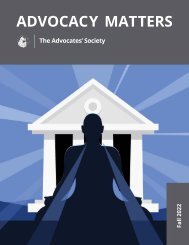Keeping Tabs - Fall 2021
Stay up-to-date on news and events from our Young Advocates' Standing Committee (YASC) with Keeping Tabs.
Stay up-to-date on news and events from our Young Advocates' Standing Committee (YASC) with Keeping Tabs.
Create successful ePaper yourself
Turn your PDF publications into a flip-book with our unique Google optimized e-Paper software.
3. Be aware: Bernice Bowley of Filmore Riley LLP<br />
(Winnipeg), says, “Inform yourself about the case<br />
in advance, pay close attention to the proceedings,<br />
take accurate and thoughtful notes during any<br />
hearing, and attempt to contribute meaningfully.”<br />
4. Be watchful: Erin Breen of Sullivan Breen<br />
Defence (St. John’s), says, “Know the materials<br />
inside and out and be confident to voice your<br />
opinion particularly when you think something<br />
is being overlooked.”<br />
5. Be prepared: Tammy Coates of Lawson Lundell<br />
LLP (Calgary), says, “Being attentive to detail<br />
is one of the keys for successful second counsel—to<br />
help anticipate and be ready for next<br />
steps and to give lead counsel the flexibility of<br />
big picture analysis while knowing that nothing<br />
is ‘falling through the cracks’.”<br />
6. Be helpful: Atrisha Lewis of McCarthy Tétrault<br />
LLP (Toronto), says, “think about how you can<br />
make life easier for senior counsel and soak up<br />
all the learnings you can.”<br />
of its program, “Second Chair, Not Second Fiddle,”<br />
on October 6, <strong>2021</strong>.<br />
The following insights were drawn from leading<br />
advocates and practitioners from across the<br />
country, with practical advice on how to succeed<br />
as “second chair”.<br />
1. Be invested: Marie Henein of Henein Hutchison<br />
LLP (Toronto), says, “My advice is that you don’t<br />
think of yourself as a second chair – you are as<br />
valuable, as responsible and as invested as the<br />
first chair.”<br />
2. Be critical: Miranda Lam of McCarthy Tétrault<br />
LLP (Vancouver), says, “Don’t assume the first chair<br />
is right. The best outcomes (inside and outside a<br />
courtroom) in complex cases come from debating<br />
the cases, the facts, the law, the nuances and the<br />
strategy. Trust your preparation and your instincts<br />
and raise the thorny questions and blindspots.”<br />
Several themes stand out from these insights.<br />
Being engaged in the file is about more than<br />
taking insightful notes and mastering the materials:<br />
it’s also about taking responsibility and<br />
anticipating next steps.<br />
As advocates our ultimate duty is to our client,<br />
whether in a support role or as lead counsel. By<br />
taking ownership of the file, each member of<br />
the litigation team can reduce errors, avoid near<br />
misses, enrich perspective, and strengthen argument.<br />
Underlying all this advice is a foundation<br />
of trust, mentorship, and communication. If you<br />
are unsure how to contribute, ask lead counsel<br />
and peers, and learn how to best contribute and<br />
excel as a second chair on your next mandate.<br />
Editor’s Note: Want to know more? The archive<br />
of the October 6, <strong>2021</strong> “Second Chair, Not Second<br />
Fiddle” program is available in the TAS<br />
On-Demand Archive portal here.<br />
7


















